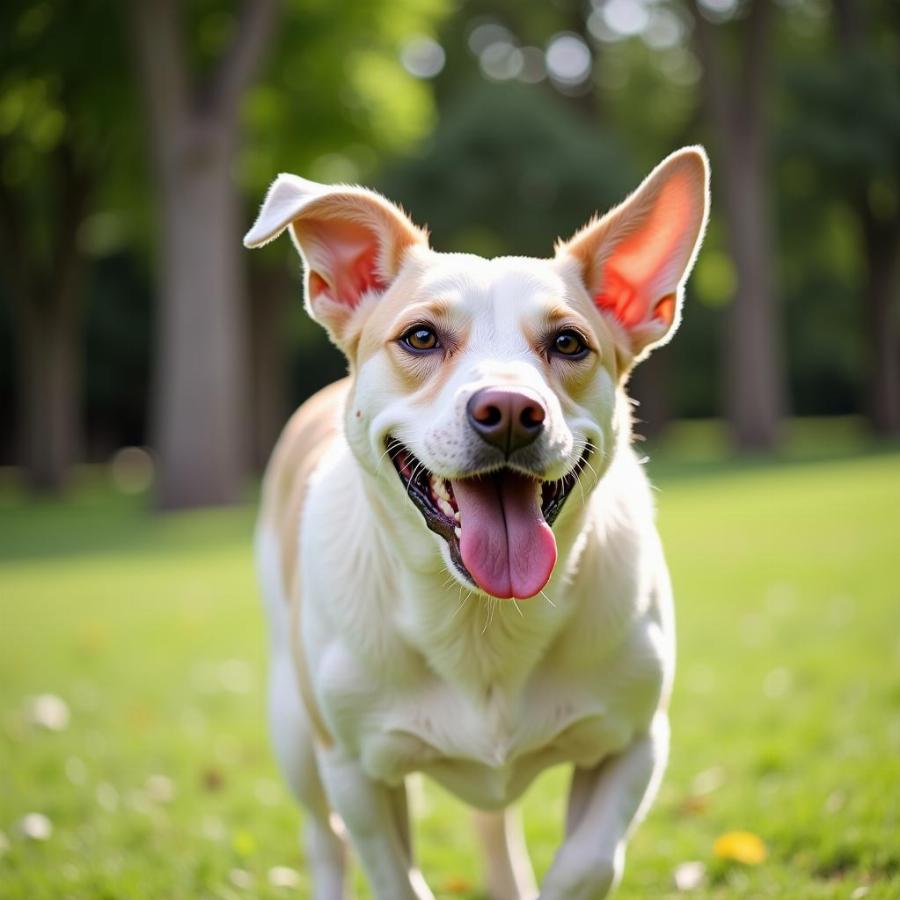Epiotic ear cleaners are a common tool in any dog owner’s arsenal, especially if you have a breed prone to ear infections. But how do you choose the right one? And how do you use it safely and effectively? This comprehensive guide will delve into everything you need to know about epiotic ear cleaners for dogs, from understanding why they’re necessary to choosing the best product for your furry friend.
Understanding the Need for Epiotic Ear Cleaners
Your dog’s ears are delicate and can be prone to infections due to a variety of factors, including allergies, bacteria, yeast, ear mites, and even excessive moisture. Regular cleaning with an appropriate epiotic solution can help prevent these issues by removing excess wax, debris, and potential irritants. It’s important to remember that not all ear cleaners are created equal, and using the wrong type can actually worsen existing problems or even create new ones. That’s why understanding the different types of epiotic ear cleaners and choosing the right one for your dog’s specific needs is crucial.
Choosing the Right Epiotic Ear Cleaner
What to Look For: Many epiotic ear cleaners are available on the market, each formulated for different purposes. Some contain drying agents for dogs with moist ear canals, while others have antibacterial or antifungal ingredients to combat specific infections. Always consult with your veterinarian to determine the best type of ear cleaner for your dog’s needs.
Ingredients to Avoid: Certain ingredients can be harsh and irritating to your dog’s delicate ears. Avoid cleaners containing alcohol, as they can dry out the ear canal and potentially exacerbate infections. Also, be cautious of fragrances and dyes, which can cause allergic reactions in some dogs.
Types of Cleaners: Common types include ceruminolytic agents (to break down earwax), antiseptic solutions (to kill bacteria and fungi), and drying agents (for excess moisture). Your vet can recommend the best option based on your dog’s individual needs.
How to Use Epiotic Ear Cleaner Correctly
Step-by-step Guide:
- Gather your supplies: You’ll need the ear cleaner recommended by your vet, cotton balls or gauze squares, and treats to reward your dog.
- Position your dog: Have your dog sit or lie down in a comfortable position.
- Fill the ear canal: Gently lift the ear flap and fill the ear canal with the cleaning solution.
- Massage the base of the ear: Gently massage the base of the ear for about 30 seconds to distribute the solution and loosen debris.
- Allow your dog to shake: Let your dog shake their head to help dislodge any loosened debris.
- Wipe away excess solution and debris: Use cotton balls or gauze squares to gently wipe away any remaining solution and debris from the outer ear canal. Never insert anything into the ear canal itself.
When to See a Veterinarian
While regular ear cleaning can help prevent infections, some signs warrant a trip to the vet. If your dog exhibits excessive scratching, head shaking, redness, swelling, discharge, or a foul odor coming from the ears, consult your veterinarian immediately. These symptoms could indicate an underlying infection requiring medical treatment.
Why is my dog shaking his head after using ear cleaner?
This is normal! Your dog is trying to dislodge any loosened debris and excess solution from their ear canal.
Can I use human ear cleaner on my dog?
Absolutely not! Human ear cleaners often contain ingredients that are toxic to dogs and can cause serious harm.
How often should I clean my dog’s ears?
This depends on your dog’s breed and individual needs. Your veterinarian can recommend an appropriate cleaning schedule.
Conclusion
Epiotic ear cleaners are an essential part of maintaining your dog’s ear health. By understanding how to choose and use them correctly, you can help prevent infections and keep your furry friend happy and comfortable. Remember to consult your vet for personalized recommendations and always address any concerning symptoms promptly.
 Happy Dog with Healthy Ears
Happy Dog with Healthy Ears
FAQ
- What is the best epiotic ear cleaner for my dog? Always consult your veterinarian.
- How can I tell if my dog has an ear infection? Look for excessive scratching, head shaking, redness, swelling, discharge, or a foul odor.
- Can I use hydrogen peroxide to clean my dog’s ears? No, it can irritate and damage the delicate ear canal.
- Is it normal for my dog’s ears to smell a little? A faint odor can be normal, but a strong or foul odor indicates a problem.
- My dog keeps shaking its head even after I cleaned its ears. What should I do? Consult your veterinarian, as this could indicate an underlying issue.
- Are there any home remedies for dog ear infections? While some home remedies may offer temporary relief, it’s best to consult your veterinarian for proper diagnosis and treatment.
- How can I prevent ear infections in my dog? Regular cleaning with a vet-approved ear cleaner, proper drying after swimming, and addressing underlying allergies can help.
Related Articles on Beaut Dogs:
- Link to article about dog ear infections
- Link to article about dog grooming
- Link to article about choosing the right vet
- Link to article about common dog allergies
Beaut Dogs: Your Trusted Source for Dog Care
Beaut Dogs is your one-stop resource for all things dog-related, providing expert advice and reliable information to help you care for your canine companion. From breed information to health and grooming tips, we’re here to support you every step of the way. When you need personalized guidance, contact us at Email: [email protected] to receive detailed and accurate answers from the Beaut Dogs team. Visit us at https://beautdogs.com.